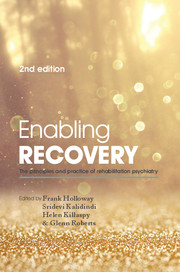Book contents
- Frontmatter
- Contents
- List of contributors
- List of figures, tables and boxes
- Preface
- Part 1 Setting the scene
- Part 2 Treatment approaches
- 7 Treatment approaches: overview
- 8 Rehabilitation at the coalface: practical approaches to helping people improve their functional skills
- 9 Cognitive approaches: cognitive–behavioural therapy and cognitive remediation therapy
- 10 Family interventions
- 11 Working with challenging behaviour
- 12 Working with coexisting substance misuse
- 13 Creative therapies and creativity
- 14 Management of medication when treatment is failing
- 15 Physical healthcare
- Part 3 Key elements of a rehabilitation service
- Part 4 Special topics in psychiatric rehabilitation
- Part 5 Future directions
- Index
7 - Treatment approaches: overview
from Part 2 - Treatment approaches
Published online by Cambridge University Press: 02 January 2018
- Frontmatter
- Contents
- List of contributors
- List of figures, tables and boxes
- Preface
- Part 1 Setting the scene
- Part 2 Treatment approaches
- 7 Treatment approaches: overview
- 8 Rehabilitation at the coalface: practical approaches to helping people improve their functional skills
- 9 Cognitive approaches: cognitive–behavioural therapy and cognitive remediation therapy
- 10 Family interventions
- 11 Working with challenging behaviour
- 12 Working with coexisting substance misuse
- 13 Creative therapies and creativity
- 14 Management of medication when treatment is failing
- 15 Physical healthcare
- Part 3 Key elements of a rehabilitation service
- Part 4 Special topics in psychiatric rehabilitation
- Part 5 Future directions
- Index
Summary
Introduction
In this part of the book the next eight chapters discuss approaches to treatment in rehabilitation practice. What does treatment mean for people with longer-term psychoses who find themselves in rehabilitation settings? The challenge is great, but the rewards greater. All our authors underline the key importance of forming good therapeutic relationships. An overwhelming sense of hope, despite the challenges, comes through strongly in all the contributions, as our authors answer the question posed. Together, they provide the reader with a formidable array of therapeutic approaches.
This group of people experience complex, multiple and severe issues that affect their ability to live safely and independently in the community. Good treatment necessitates addressing needs by using interventions that are informed by the best evidence. A longer period of engagement may be required than is usual just to facilitate access, and treatments may need to be used particularly creatively and flexibly. The ability to build up a trusting and compassionate working relationship and ensure person-centred practice is central to success. This requires supporting service users to identify their strengths, their resources and their goals. It is necessary to work alongside them, their families and key people in other services to enable holistic, incremental, ‘long-view’ care and progress. The ‘whole system’ approach advocated throughout this book seeks to use everyone within the extended team, working towards common goals alongside the service user. The aim is increasing self-management of the service user's condition(s) and greater independence, with occasional setbacks being understood to be par for the course and an opportunity for learning.
To expand further on the ‘person-centred’ premise, this is about meeting people at whatever point they are on their journey, engaging them, endeavouring to understand them and formulating with them and their significant others an individualised, bespoke or tailor-made plan. Having knowledge of a person's narrative, maintaining continuity and ensuring that necessary support is not taken away before the person is ready are all important. The authors in Part 2 uniformly emphasise the importance of treatment as ‘working with’ people as agents in their recovery rather than merely ‘doing to’ a passive recipient of care.
Information
- Type
- Chapter
- Information
- Enabling Recovery , pp. 113 - 119Publisher: Royal College of PsychiatristsPrint publication year: 2015
